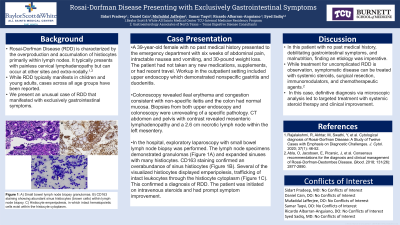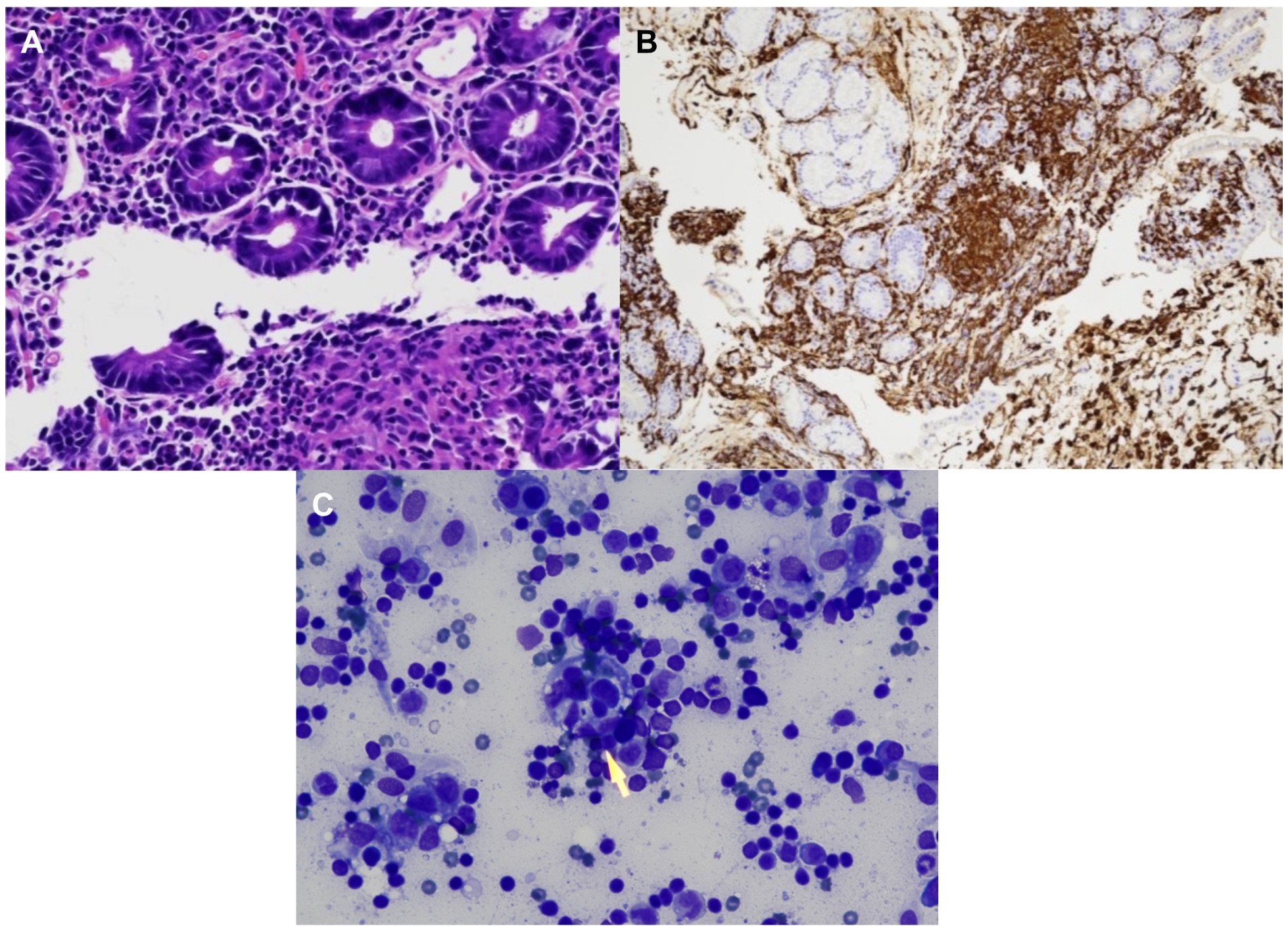Sunday Poster Session
Category: Small Intestine
P1550 - Rosai-Dorfman Disease Presenting With Exclusively Gastrointestinal Symptoms
Sunday, October 27, 2024
3:30 PM - 7:00 PM ET
Location: Exhibit Hall E

Has Audio
- MJ
Mufaddal Jafferjee, DO
Baylor Scott and White All Saints Medical Center
Fort Worth, TX
Presenting Author(s)
Sidart Pradeep, MD, MS1, Daniel Cain, DO2, Mufaddal Jafferjee, DO1, Samar Taqvi, DO2, Syed Sadiq, MD3
1Baylor Scott and White All Saints Medical Center, Fort Worth, TX; 2Baylor All Saints, Fort Worth, TX; 3Texas Digestive Disease Consultants, Fort Worth, TX
Introduction: Rosai-Dorfman Disease (RDD) is a rare disease characterized by the overproduction and accumulation of histiocytes primarily within lymph nodes. This condition typically presents with painless cervical lymphadenopathy but can occur at other sites and extra-nodally. While RDD typically manifests in children and young adults, cases across all age groups have been reported. Despite its benign nature in most instances, RDD can present diagnostic challenges because it resembles other lymphoproliferative and autoimmune disorders. We present an unusual case of RDD that manifested with exclusively gastrointestinal symptoms.
Case Description/Methods: A 39-year-old female with no past medical history presented to the emergency department with six weeks of abdominal pain, intractable nausea and vomiting, and 30-pound weight loss. The patient had not taken any new medications, supplements, or had recent travel. Workup in the outpatient setting included upper endoscopy which demonstrated nonspecific gastritis and duodenitis. Colonoscopy revealed ileal erythema and congestion consistent with non-specific ileitis and the colon had normal mucosa. Biopsies from both upper endoscopy and colonoscopy were unrevealing of a specific pathology. CT abdomen and pelvis with contrast revealed mesenteric lymphadenopathy and a 2.6 cm necrotic lymph node within the left mesentery.
In the hospital, exploratory laparoscopy with small bowel lymph node biopsy was performed. The lymph node specimens demonstrated granulomas (Figure A) and expanded sinuses with many histiocytes. CD163 staining confirmed an overabundance of sinus histiocytes (Figure B). Several of the visualized histiocytes displayed emperipolesis, trafficking of intact leukocytes through the histiocyte cytoplasm (Figure C). This confirmed a diagnosis of RDD. The patient was initiated on intravenous steroids and had prompt symptom improvement.
Discussion: In this patient with no past medical history, debilitating gastrointestinal symptoms, and malnutrition, finding an etiology was imperative. Small bowel lymph node biopsy demonstrated granulomatous disease which can suggest a variety of conditions. The CD163 stain was key to clinching a biopsy diagnosis in this patient. While treatment for uncomplicated RDD is observation, symptomatic disease can be treated with systemic steroids, surgical resection, immunomodulators, and chemotherapeutic agents. In this case, definitive diagnosis led to targeted treatment with systemic steroid therapy and clinical improvement.

Disclosures:
Sidart Pradeep, MD, MS1, Daniel Cain, DO2, Mufaddal Jafferjee, DO1, Samar Taqvi, DO2, Syed Sadiq, MD3. P1550 - Rosai-Dorfman Disease Presenting With Exclusively Gastrointestinal Symptoms, ACG 2024 Annual Scientific Meeting Abstracts. Philadelphia, PA: American College of Gastroenterology.
1Baylor Scott and White All Saints Medical Center, Fort Worth, TX; 2Baylor All Saints, Fort Worth, TX; 3Texas Digestive Disease Consultants, Fort Worth, TX
Introduction: Rosai-Dorfman Disease (RDD) is a rare disease characterized by the overproduction and accumulation of histiocytes primarily within lymph nodes. This condition typically presents with painless cervical lymphadenopathy but can occur at other sites and extra-nodally. While RDD typically manifests in children and young adults, cases across all age groups have been reported. Despite its benign nature in most instances, RDD can present diagnostic challenges because it resembles other lymphoproliferative and autoimmune disorders. We present an unusual case of RDD that manifested with exclusively gastrointestinal symptoms.
Case Description/Methods: A 39-year-old female with no past medical history presented to the emergency department with six weeks of abdominal pain, intractable nausea and vomiting, and 30-pound weight loss. The patient had not taken any new medications, supplements, or had recent travel. Workup in the outpatient setting included upper endoscopy which demonstrated nonspecific gastritis and duodenitis. Colonoscopy revealed ileal erythema and congestion consistent with non-specific ileitis and the colon had normal mucosa. Biopsies from both upper endoscopy and colonoscopy were unrevealing of a specific pathology. CT abdomen and pelvis with contrast revealed mesenteric lymphadenopathy and a 2.6 cm necrotic lymph node within the left mesentery.
In the hospital, exploratory laparoscopy with small bowel lymph node biopsy was performed. The lymph node specimens demonstrated granulomas (Figure A) and expanded sinuses with many histiocytes. CD163 staining confirmed an overabundance of sinus histiocytes (Figure B). Several of the visualized histiocytes displayed emperipolesis, trafficking of intact leukocytes through the histiocyte cytoplasm (Figure C). This confirmed a diagnosis of RDD. The patient was initiated on intravenous steroids and had prompt symptom improvement.
Discussion: In this patient with no past medical history, debilitating gastrointestinal symptoms, and malnutrition, finding an etiology was imperative. Small bowel lymph node biopsy demonstrated granulomatous disease which can suggest a variety of conditions. The CD163 stain was key to clinching a biopsy diagnosis in this patient. While treatment for uncomplicated RDD is observation, symptomatic disease can be treated with systemic steroids, surgical resection, immunomodulators, and chemotherapeutic agents. In this case, definitive diagnosis led to targeted treatment with systemic steroid therapy and clinical improvement.

Figure: Figure A) Small bowel lymph node biopsy granulomas. Figure B) CD163 staining showing abundant sinus histiocytes (brown cells) within lymph node biopsy. Figure C) Histiocyte emperipolesis, in which intact hematopoietic cells exist within the histocyte cytoplasm.
Disclosures:
Sidart Pradeep indicated no relevant financial relationships.
Daniel Cain indicated no relevant financial relationships.
Mufaddal Jafferjee indicated no relevant financial relationships.
Samar Taqvi indicated no relevant financial relationships.
Syed Sadiq indicated no relevant financial relationships.
Sidart Pradeep, MD, MS1, Daniel Cain, DO2, Mufaddal Jafferjee, DO1, Samar Taqvi, DO2, Syed Sadiq, MD3. P1550 - Rosai-Dorfman Disease Presenting With Exclusively Gastrointestinal Symptoms, ACG 2024 Annual Scientific Meeting Abstracts. Philadelphia, PA: American College of Gastroenterology.
